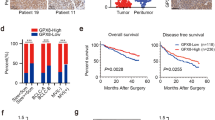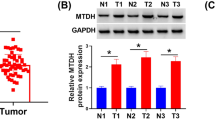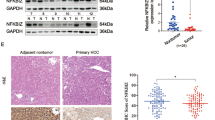Abstract
Objective
To investigate the impact of SERPINA3 on the migration, invasion, and liver metastasis of colon cancer cells.
Methods
Immunohistochemical staining was conducted to determine SERPINA3 expression in the cancer and adjacent normal tissues of 131 patients suffering from colon cancer. In vitro experiment, colon cancer cells with low (HT-29P), intermediate (KM-12C), and high (HT-29LMM, KM-12L4) metastatic potential were obtained to examine SERPINA3 expression levels. Besides, quantitative real-time PCR (qRT-PCR) and Western Blot were performed to detect SERPINA3 expression in HT-29LMM and KM-12L4 cells transfected with SERPINA3 siRNA; Wound-healing and Transwell assays to measure cell migration and invasion, respectively; and ELISA to detect MMP-2 and MMP-9 levels. In vivo experiment, mice with liver metastasis of colon cancer were established to observe the effect of SERPINA3 silencing on liver metastasis. Immunohistochemical assay was applied to evaluate the expressions of Serpina3, Mmp-2, Mmp-9, and proliferating cell nuclear antigen (Pcna) in liver metastasis tissues.
Results
SERPINA3 in colon cancer tissues was higher than in adjacent normal tissues, which was associated with patients’ clinicopathological features. Besides, SERPINA3 expression showed a rising trend in low, intermediate, and high metastatic potential colon cancer cells. After KM-12L4 and HT-29LMM cells transfected with SERPINA3 siRNA, the migration and invasive ability of cells, as well as the expression levels of MMP-2 and MMP-9 were all decreased. Moreover, SERPINA3 siRNA could not only reduce live metastasis of mice, but also down-regulate the expression of Mmp-2 and Mmp-9 in liver metastasis tissues.
Conclusion
SERPINA3 silencing could inhibit the migration, invasion, and liver metastasis of colon cancer cells.






Similar content being viewed by others
References
Siegel RL, Miller KD, Jemal A. Cancer Statistics, 2017. CA Cancer J Clin. 2017;67:7–30.
Xia ZS, Wu D, Zhong W, Lu XJ, Yu T, Chen QK. Wip1 gene silencing enhances the chemosensitivity of human colon cancer cells. Oncol Lett. 2017;14:1875–1883.
Chen Y, Fang L, Li G, et al. Synergistic inhibition of colon cancer growth by the combination of methylglyoxal and silencing of glyoxalase I mediated by the STAT1 pathway. Oncotarget. 2017;8:54838–54857.
Ding YL, Wang QS, Zhao WM, Xiang L. Expression of smoothened protein in colon cancer and its prognostic value for postoperative liver metastasis. Asian Pac J Cancer Preven APJCP. 2012;13:4001–4005.
Hao CY, Ji JF. Surgical treatment of liver metastases of colorectal cancer: strategies and controversies in 2006. European J Surg Oncol. 2006;32:473–483.
Subramaniam V, Vincent IR, Gilakjan M, Jothy S. Suppression of human colon cancer tumors in nude mice by siRNA CD44 gene therapy. Exp Mol Pathol. 2007;83:332–340.
Luo D, Chen W, Tian Y, et al. Serpin peptidase inhibitor, clade A member 3 (SERPINA3), is overexpressed in glioma and associated with poor prognosis in glioma patients. OncoTargets Ther. 2017;10:2173–2181.
Baker C, Belbin O, Kalsheker N, Morgan K. SERPINA3 (aka alpha-1-antichymotrypsin). Front Biosci J Virtual Libr. 2007;12:2821–2835.
Zhou J, Cheng Y, Tang L, Martinka M, Kalia S. Up-regulation of SERPINA3 correlates with high mortality of melanoma patients and increased migration and invasion of cancer cells. Oncotarget. 2017;8:18712–18725.
Li Y, Rong G, Kang H. Taxotere-induced elevated expression of IL8 in carcinoma-associated fibroblasts of breast invasive ductal cancer. Oncol Lett. 2017;13:1856–1860.
Jung YJ, Katilius E, Ostroff RM, et al. Development of a protein biomarker panel to detect non-small-cell lung cancer in Korea. Clin Lung Cancer. 2017;18:e99–e107.
Yang GD, Yang XM, Lu H, et al. SERPINA3 promotes endometrial cancer cells growth by regulating G2/M cell cycle checkpoint and apoptosis. Int J Clin Exp Pathol. 2014;7:1348–1358.
Peltier J, Roperch JP, Audebert S, Borg JP, Camoin L. Quantitative proteomic analysis exploring progression of colorectal cancer: modulation of the serpin. Fam J Proteomics. 2016;148:139–148.
Long NP, Lee WJ, Huy NT, Lee SJ, Park JH, Kwon SW. Novel biomarker candidates for colorectal cancer metastasis: a meta-analysis of in vitro studies. Cancer Inf. 2016;15:11–17.
Karashima S, Kataoka H, Itoh H, Maruyama R, Koono M. Prognostic significance of alpha-1-antitrypsin in early stage of colorectal carcinomas. Int J Cancer. 1990;45:244–250.
World Medical A. World Medical Association Declaration of Helsinki: ethical principles for medical research involving human subjects. JAMA. 2013;310:2191–2194.
Orlans FB. Ethical decision making about animal experiments. Ethics Behav. 1997;7:163–171.
Edge SB, Compton CC. The American Joint Committee on Cancer: the 7th edition of the AJCC cancer staging manual and the future of TNM. Ann Surg Oncol. 2010;17:1471–1474.
Schluter K, Gassmann P, Enns A, et al. Organ-specific metastatic tumor cell adhesion and extravasation of colon carcinoma cells with different metastatic potential. Am J Pathol. 2006;169:1064–1073.
Lalitha S. Primer Premier 5. Biotech Softw Internet Rep. 2004;1:270–272.
Jovanovic M, Stefanoska I, Radojcic L, Vicovac L. Interleukin-8 (CXCL8) stimulates trophoblast cell migration and invasion by increasing levels of matrix metalloproteinase (MMP)2 and MMP9 and integrins alpha5 and beta1. Reproduction. 2010;139:789–798.
Fromowitz FB, Viola MV, Chao S, et al. ras p21 expression in the progression of breast cancer. Hum Pathol. 1987;18:1268–1275.
Smith LA, Masood S, Jagadish B, Saffos RO, Rhatigan RM, Stephenson SE Jr. A modification of the Dukes’ classification of carcinoma of the colon and rectum. Am Surg. 1978;44:94–97.
Yuan SX, Wang DX, Wu QX, et al. BMP9/p38 MAPK is essential for the antiproliferative effect of resveratrol on human colon cancer. Oncol Rep. 2016;35:939–947.
Zong Z, Zhou T, Rao L, et al. Musashi2 as a novel predictive biomarker for liver metastasis and poor prognosis in colorectal cancer. Cancer Med. 2016;5:623–630.
Chao Y, Fan C, Liang Y, Gao B, Zhang S. A novel serpin with antithrombin-like activity in Branchiostoma japonicum: implications for the presence of a primitive coagulation system. PloS One. 2012;7:e32392.
Janciauskiene S. Conformational properties of serine proteinase inhibitors (serpins) confer multiple pathophysiological roles. Biochimica et biophysica acta. 2001;1535:221–235.
Kamboh MI, Minster RL, Kenney M, et al. Alpha-1-antichymotrypsin (ACT or SERPINA3) polymorphism may affect age-at-onset and disease duration of Alzheimer’s disease. Neurobiol Aging. 2006;27:1435–1439.
Slowik A, Borratynska A, Turaj W, et al. Alpha1-antichymotrypsin gene (SERPINA3) A/T polymorphism as a risk factor for aneurysmal subarachnoid hemorrhage. Stroke. 2005;36:737–740.
Kotula E, Berthault N, Agrario C, et al. DNA-PKcs plays role in cancer metastasis through regulation of secreted proteins involved in migration and invasion. Cell Cycle. 2015;14:1961–1972.
Chapman MH, Tidswell R, Dooley JS, et al. Whole genome RNA expression profiling of endoscopic biliary brushings provides data suitable for biomarker discovery in cholangiocarcinoma. J Hepatol. 2012;56:877–885.
Kloth JN, Gorter A, Fleuren GJ, et al. Elevated expression of SerpinA1 and SerpinA3 in HLA-positive cervical carcinoma. J Pathol. 2008;215:222–230.
Dimberg J, Strom K, Lofgren S, Zar N, Hugander A, Matussek A. Expression of the serine protease inhibitor serpinA3 in human colorectal adenocarcinomas. Oncol Lett. 2011;2:413–418.
Hamilton AJ, Baulcombe DC. A species of small antisense RNA in posttranscriptional gene silencing in plants. Science. 1999;286:950–952.
Oh YK. Park TG. siRNA delivery systems for cancer treatment Advanced drug delivery reviews. 2009;61:850-862; Devi GR. siRNA-based approaches in cancer therapy. Cancer Gene Ther. 2006;13:819–829.
Mittal R, Patel AP, Debs LH, et al. Intricate Functions of Matrix Metalloproteinases in Physiological and Pathological Conditions. J Cell Physiol. 2016;231:2599–2621.
de Oliveira Poswar F, de Carvalho Fraga CA, Gomes ES, et al. Protein expression of MMP-2 and MT1-MMP in actinic keratosis, squamous cell carcinoma of the skin, and basal cell carcinoma. Int J Surg Pathol. 2015;23:20–25.
Pintha K, Yodkeeree S, Limtrakul P. Proanthocyanidin in red rice inhibits MDA-MB-231 breast cancer cell invasion via the expression control of invasive proteins. Biol Pharm Bull. 2015;38:571–581.
Huang CH, Jayakumar T, Chang CC, et al. Hinokitiol Exerts Anticancer Activity through Downregulation of MMPs 9/2 and Enhancement of Catalase and SOD Enzymes: in vivo augmentation of lung histoarchitecture. Molecules. 2015;20:17720–17734.
Tutton MG, George ML, Eccles SA, Burton S, Swift RI, Abulafi AM. Use of plasma MMP-2 and MMP-9 levels as a surrogate for tumour expression in colorectal cancer patients. Int J Cancer. 2003;107:541–550.
Acknowledgments
The authors like to appreciate the reviewers for their helpful and instructive comments on this article.
Author information
Authors and Affiliations
Corresponding author
Ethics declarations
Conflict of interest
All authors declare that they have no conflict of interest.
Rights and permissions
About this article
Cite this article
Cao, LL., Pei, XF., Qiao, X. et al. SERPINA3 Silencing Inhibits the Migration, Invasion, and Liver Metastasis of Colon Cancer Cells. Dig Dis Sci 63, 2309–2319 (2018). https://doi.org/10.1007/s10620-018-5137-x
Received:
Accepted:
Published:
Issue Date:
DOI: https://doi.org/10.1007/s10620-018-5137-x




